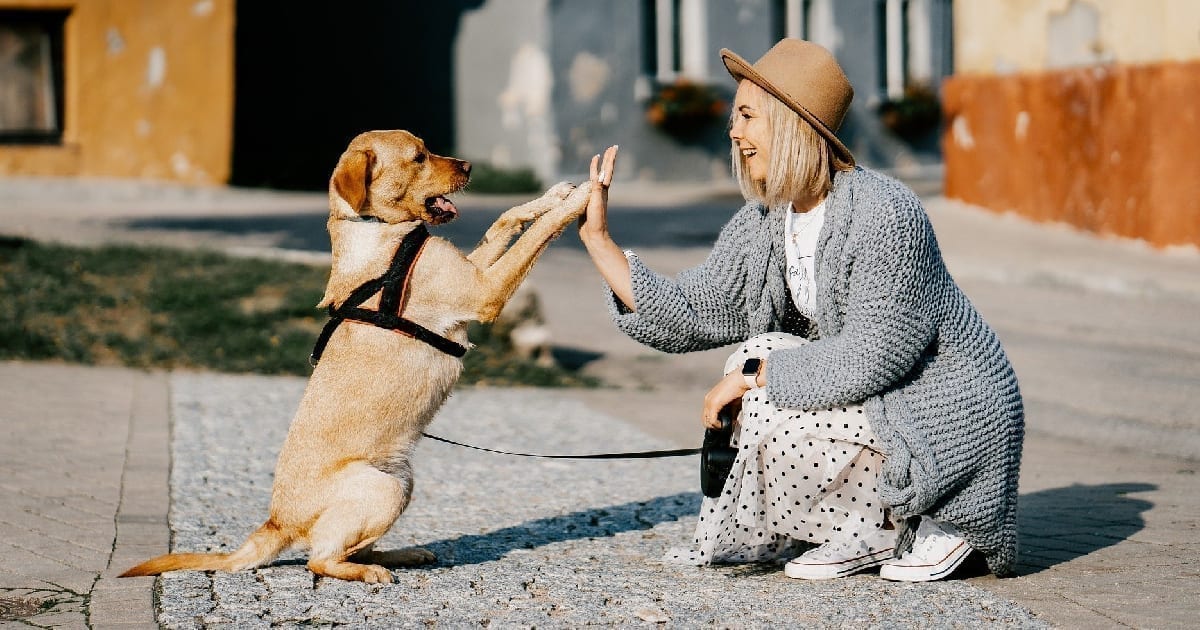
You’re getting a dog, and we are so excited for you!
Your new family member is almost ready to come home, but before those four furry paws can step foot in the house, you’ll need to have everything prepared for the canine whirlwind that’s about to upend your life in the best way possible.
In this second installment of our two-part guide to getting ready for a dog, we’ll cover the supplies you’ll need before bringing the new baby home. Before you go buying all the dog goodies in the world, let’s start with prepping the house.

Before Getting a Dog, Prep the House
When it’s just adult humans in the house, we sometimes forget about the little things that can turn into a disaster for children and animals. If you have kids, your house probably already has some of these safety precautions taken care of, but let’s double-check and go over any additional household hazards for dogs.
Gates and Pens
Hounds like to snoop, but sometimes they aren’t ready for free-ranging the house. To keep a snooper safe, put up baby gates to create boundaries. If you need to keep your dog limited to one area of a room, set up an exercise pen. The American Kennel Club offers tips on finding the right playpen.
Remove Stray Cords
Electrical cords are an electrocution hazard for kids and fur kids alike. Do a sweep of your home and pickup up any unused or hanging cords. If the cords are in use and can’t be removed, look into cord covers or tuck them behind furniture where your dog can’t access them.
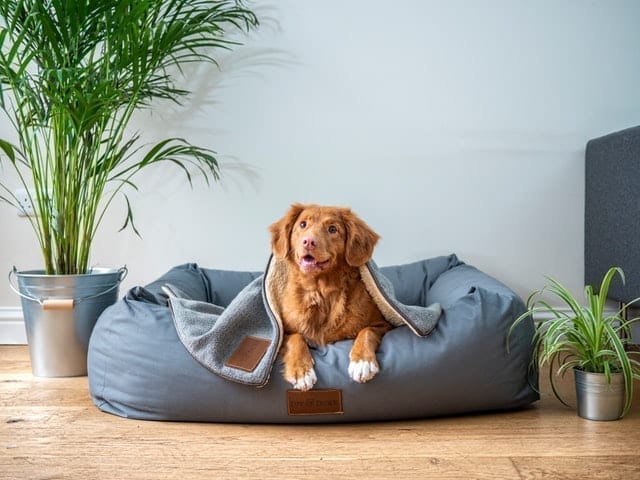
Pick Up Choking Hazards
Dogs love to eat random stuff they find lying around. They’re curious and can’t help it! But we can help them by ensuring there’s nothing in reach of a dog’s mouth that might choke them. Small children’s toys, stuffed animals not meant for canines, tools, batteries, plants, your favorite shirt—you name it!—a dog might put it in their mouth.
You may find it helpful to view the rooms in your home from a dog’s eye view. Get down on your hands and knees, then pick up everything you see that could be deemed a choking hazard. Plus, anything you don’t want slobber on!
Put Away Your Shoes and Socks, etc.
Socks, shoes, underwear, and any other item that bears your scent is highly desirable to your dog. Not only can these items be choking hazards, but they can also cause life-threatening intestinal blockages. Remove temptation and throw your shoes in the closet and dirty clothes in the hamper where doggos can’t get to them.
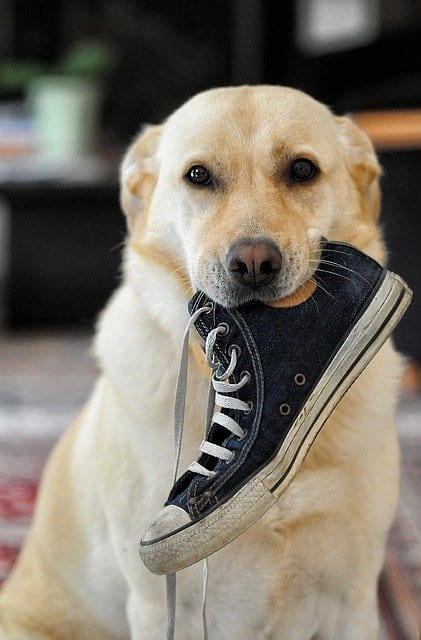
Secure Chemicals, Toxic Cleansers, and Medicines
Be sure any household chemicals, including cleansers, are put away behind cabinet doors or in high places. This also applies to medicines, both over-the-counter and prescription. Even if that medicine is for the dog, make sure they can’t get to it.
Check Any Loose Doors and Windows
Make sure all doors latch properly so searching snouts can’t open them. Be sure all windows close and lock properly as well. Dogs can be tricky and nose windows open for quick escapes. Stay ahead of them by assuring doors and windows close and lock securely.
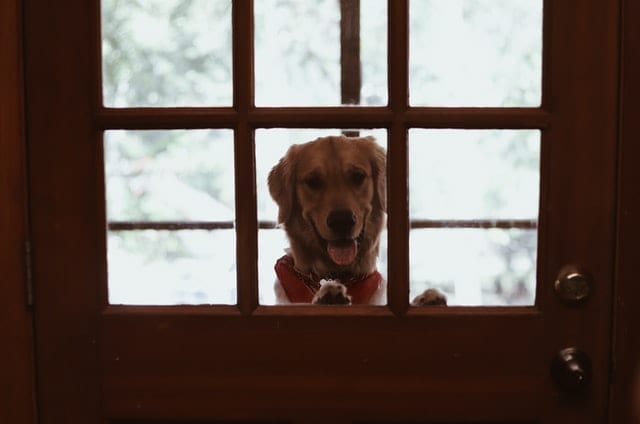
Cover the Trash
Dogs will get into the garbage because, let’s face it, they love a good stink. And the trash is the perfect place to find it. Just think of how many dangerous items are jammed into your kitchen trash, from choking hazards to spoiled food. Vets even have a name for the upset bellies these trash-surfing dogs develop: “garbage gut.”
Choose a stable can with a closed lid that can’t be knocked over. This applies to the kitchen and bathrooms as tissues and feminine products can also be dangerous.
Store Food Out of Reach
If there’s food out and within a dog’s reach, temptation may get the best of him. This goes for raw meat and bones as well as potentially toxic ingredients. Even the bags that store your food can be dangerous. Far too many innocent dogs have suffocated due to bread and chip bags, so be sure to put your snacks in the pantry or fridge.
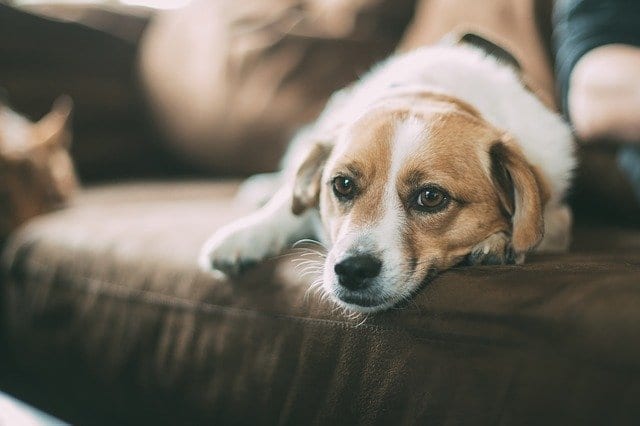
Whew! The house is finally ready for a dog when it comes to safety, which means it’s time to fill it with supplies. Here is a list of the things you will need before getting a dog.
Supplies You’ll Need Before Getting a Dog
Whether you’ve settled on getting a puppy, an adult, or a senior, canines have the same basic needs at every age. This list of supplies is universal at every age and can be tweaked for puppy needs or senior dogs.
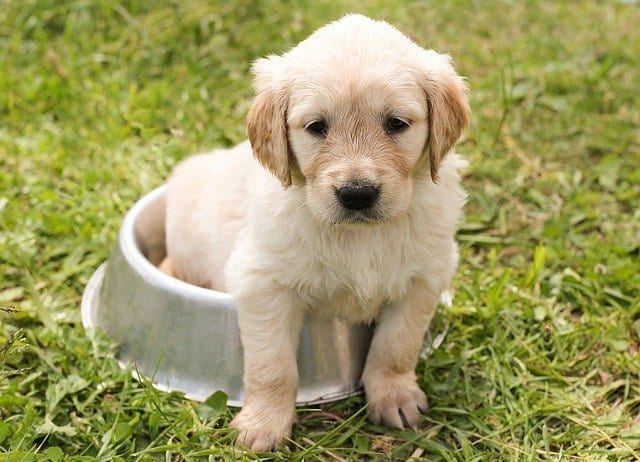
Here’s everything you’ll need to have on hand before doggo comes home!
- Food
- Don’t wait until your fur kid has come home to decide on her diet. Knowing about the dog you’re adopting will help you choose the right kind of food.
- Supplements
- Questions about dog supplements? Find all the answers you need here.
- Treats
- Food and Water Bowls
- Do some research on what kind of bowls will be right for your dog.
- Blankets
- Comfy Beds
- Have more than one bed on hand, as your pup will want to snooze in various spots around the house.
- Toys for Chewing
- Chewing is an important activity for dogs, and if they aren’t given a proper outlet to work those teeth, furniture, shoes, and anything else a bored dog can fit in his mouth may become targets.
- Toys for Play
- Choose toys that stimulate mind and body! Check out these tried-and-true toys loved by dogs and their parents.
- Crate
- If you need some help choosing a kennel for your dog, read this helpful guide to dog crates.
- Collar or Harness
- Leash
- Puppy Pads
- Even if you’ve adopted an adult, these are great to have on hand.
- Nail Clippers
- Brush for Grooming
- Dog Shampoo
- Towels
Download this handy checklist of dog supplies to make shopping a little easier!
Almost Through!
The supplies for your dog have been purchased; now there are just a couple more decisions you’ll need to make before your pup comes home. Who will provide your dog’s medical care? Do you need someone to aid you in their training?
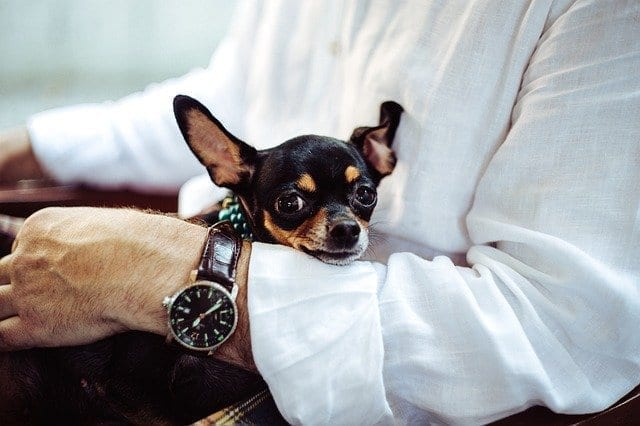
Choosing a Veterinarian
Before getting a dog, you’ll need to know which veterinarian you’ll want for your best friend’s medical care. It can be an overwhelming decision, but through informed research and recommendations from sources you trust, you’ll find the right doctor for your doggo!
If you are bringing home a puppy, you can expect to see a lot of your vet over the first year for vaccination boosters, parasite prevention, and spay/neuter surgery. Even if you are bringing home an older dog that is up to date for the year, you should schedule an appointment to establish them as a patient.
You’ll also be making trips to the vet on a semi-annual basis for checkups, vaccinations, and if your dog gets sick. We tend to worry when our fur babies are ill, so part of choosing a medical team involves finding a practice where you both feel safe and calm.
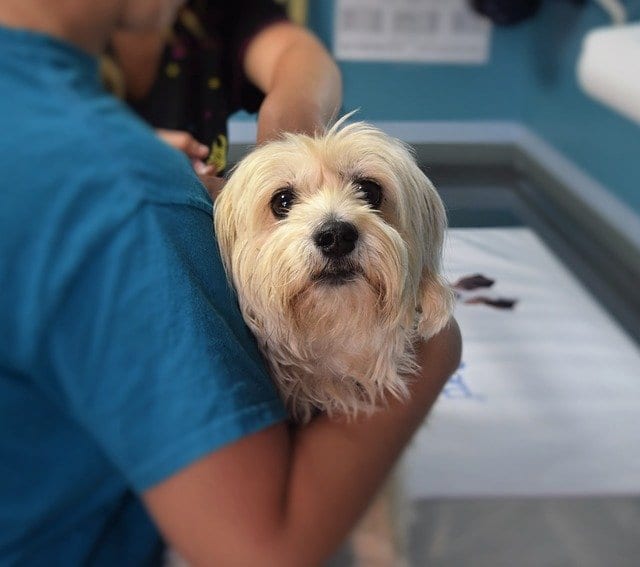
While at the vet, ask for their recommendations on flea and tick control as well as heartworm prevention.
As vet bills can be expensive, one more thing to consider when getting a dog is purchasing pet insurance to help cover expensive medical care.
Choosing a Trainer
If you’ve had dogs in the past, you may already be versed in how to train a dog. But, if you’re adopting a puppy or this is your first dog, you may want to consider working with a professional dog trainer. Working with a trained professional will help you better understand your dog, making the training process much smoother.
Before you sign up with the first trainer you find, do your research. The American Veterinary Society of Animal Behavior offers detailed guidelines for selecting the right trainer for your dog.
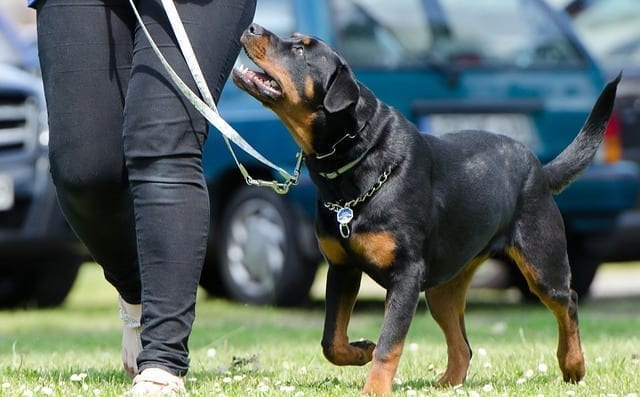
All the decisions have been made, and the supplies are ready. Guess what comes next?
It’s time to get your dog and bring her home! Congratulations on growing your family by four furry paws!
The post Before Getting A Dog Part II: Supplies To Buy & Preps To Make appeared first on iHeartDogs.com.
via Whisker Therapy